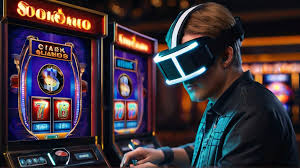When people think of casinos—both online and offline—the first game that comes to mind for many is the situs slot gacor machine. Easy to play, visually appealing, and offering the chance for big wins with just a small wager, slot games have become the backbone of the gambling industry. From their humble beginnings as mechanical devices to today’s advanced digital experiences, slots have continuously evolved while maintaining their charm and accessibility.
The Origins of Slot Machines
The story of the slot machine begins in the late 19th century. Charles Fey, a San Francisco-based mechanic, is widely credited with inventing the first modern slot machine in 1895. Known as the “Liberty Bell,” this machine had three spinning reels and five symbols—horseshoes, stars, diamonds, spades, and the Liberty Bell itself. A win was triggered when three bells lined up, awarding the player the highest payout of 50 cents.
The Liberty Bell machine was simple compared to today’s complex designs, but it introduced several concepts that remain central to slots: reels, symbols, and the element of chance. Bars, cherries, and other classic symbols soon followed as manufacturers tried to make their games stand out. By the early 20th century, slots had become a staple in bars, saloons, and gambling halls across the United States.
The Rise of Electronic and Video Slots
Mechanical slots dominated the early decades, but by the 1960s and 1970s, technology began to revolutionize the game. The first fully electromechanical slot appeared in 1963, allowing for more diverse gameplay, multiple coin inputs, and larger jackpots.
In 1976, the world was introduced to the first video slot, developed by Fortune Coin Company. Using a modified Sony TV for its display, this breakthrough replaced physical reels with digital graphics. Players were initially skeptical, but once Nevada gaming regulators approved video slots, their popularity soared. Video slots allowed game developers to experiment with themes, bonus rounds, and more interactive experiences.
Online Slots and the Digital Revolution
The 1990s marked another turning point as the internet opened new doors for gambling. Online casinos emerged, and with them, the online slot. Suddenly, players no longer needed to visit a physical casino—they could spin the reels from their own computers.
Online slots offered several advantages:
- Convenience – No travel required; games were available 24/7.
- Variety – Developers created hundreds of unique themes and designs.
- Innovation – Online platforms allowed for progressive jackpots, 3D graphics, and even skill-based features.
Progressive jackpot slots became especially popular, as they linked multiple games together across different casinos, offering massive prize pools that could reach millions of dollars. Titles like Mega Moolah and Mega Fortune gained legendary status for creating instant millionaires.
Why Slot Games Are So Popular
There are many reasons why slot games dominate both land-based and online casinos:
- Simplicity: Unlike poker or blackjack, you don’t need to learn complex rules or strategies.
- Low Barrier to Entry: Slots can be played with small bets, making them accessible to beginners.
- Variety: Themes range from ancient Egypt and Greek mythology to popular movies and TV shows.
- Excitement Factor: Bright visuals, engaging sounds, and the thrill of unpredictability create a fun, fast-paced experience.
- Potential for Big Wins: Even small wagers can lead to significant payouts, especially with bonus features and jackpots.
In fact, slot games generate the majority of revenue for casinos worldwide, highlighting their universal appeal.
Features That Enhance the Slot Experience
Modern slot games are far more advanced than their predecessors. Developers continuously add new mechanics and features to keep players entertained:
- Wild Symbols: These substitute for other symbols to complete winning combinations.
- Scatter Symbols: Often trigger free spins or bonus rounds.
- Free Spins: A popular feature that allows extra spins without additional wagers.
- Multipliers: Increase winnings by multiplying payouts.
- Bonus Rounds: Interactive mini-games within the slot that provide extra rewards.
- Progressive Jackpots: Pooled prize funds that grow with every spin until someone hits the jackpot.
These elements make slots more engaging, ensuring that no two games feel exactly alike.
The Psychology Behind Slot Games
The enduring success of the slot is not just about luck—it’s also about psychology. Game designers carefully craft every detail, from sound effects to animations, to maximize excitement and keep players engaged.
- Near Miss Effect: Seeing two jackpot symbols and a third almost align can make players feel like they’re “close” to winning, encouraging continued play.
- Random Rewards: Unpredictable outcomes trigger the brain’s reward system, similar to receiving a surprise gift.
- Immersive Themes: Story-driven slots create a sense of adventure, making gameplay more enjoyable beyond the wins and losses.
This blend of chance, anticipation, and entertainment is why slot games remain irresistible to millions of players worldwide.
The Future of Slot Gaming
As technology advances, so do slot games. The next generation of slots promises even greater innovation:
- Virtual Reality (VR) Slots – Players can step inside immersive 3D casino worlds.
- Augmented Reality (AR) Features – Bringing interactive slot elements into real-life surroundings.
- Blockchain-Based Slots – Ensuring transparency and fairness through provably fair algorithms.
- Skill-Based Slots – Adding an element of strategy for players who prefer more control.
- Cross-Platform Integration – Seamless play across mobile devices, desktops, and even smart TVs.
These innovations will likely attract an even wider audience, blurring the lines between gaming and gambling.
Responsible Slot Gaming
While slots are fun and exciting, it’s important to recognize the need for responsible play. Because of their fast pace and instant rewards, slot games can be addictive for some individuals. Responsible gaming practices include:
- Setting time and budget limits.
- Viewing slots as entertainment, not a guaranteed way to make money.
- Taking breaks to avoid excessive play.
- Using tools like deposit limits or self-exclusion features on online platforms.
Casinos and regulators are increasingly focusing on responsible gambling to ensure players enjoy slots safely and responsibly.
Conclusion
The journey of the slot game is one of constant innovation, from the Liberty Bell to today’s advanced online and mobile platforms. What started as a simple mechanical device has transformed into a multi-billion-dollar industry that combines entertainment, psychology, and cutting-edge technology.
Slots remain the most accessible and engaging form of casino entertainment, offering fun for casual players and excitement for those chasing big wins. As the industry embraces new technologies like VR, AR, and blockchain, the world of slots will only become more dynamic and immersive in the years to come.
For anyone interested in the intersection of gaming, technology, and chance, the story of the slot game is far from over—it’s just entering its most exciting chapter yet.

